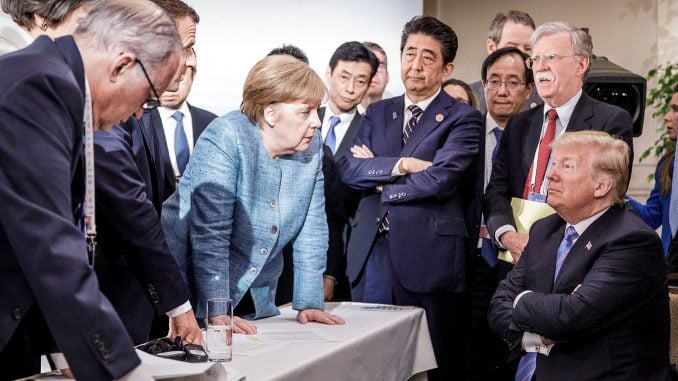
Total free and fair trade.
Unmitigated by tariffs, trade barriers or artificial restrictions established by government to avoid pure unadulterated business competition.
Our trading partners around the world, as well as many business leaders in America, like the way things are right now. The more protection they receive from government, the harder it is to wean them off government assistance to compete on a fair and level playing field worldwide.
President Trump is right to call for an end to all tariffs and barriers and move toward a global free trade zone. He should press to lower nation-specific U.S. tariffs by 10 percent per year and tell each trading partner nation that as long as they lower their tariffs on U.S. goods and services by commensurate percentages annually, the U.S. will continue to trade with them and lower tariffs until they hit zero on both sides of the equation.
Countries will have to reduce their dependence on unfair trade barriers such as overregulation and currency manipulation which will obviate the need for tariffs in the first place.
The very existence of mutually agreed-upon tariffs between nations sets up the threat of retaliatory tariffs that lead to trade wars later. Free and fair trade can only be accomplished in a tariff-free world.
Tariffs are used typically to protect domestic industries in developing countries that want to grow up the economic ladder to modernity. However, once protected, an industry always wants to “stay protected,” be they in America or overseas.
The Canadian tariff on U.S. milk is 270 percent to protect the interests of 11,000 Canadian dairy farmers. Not the consumers.
In 1791, America was “China” in terms of trade piracy and protectionism. Treasury Secretary Alexander Hamilton wrote the first “Report on Manufactures” which encouraged the nascent government to pay spies to steal English textile manufacturing secrets and bring designs of textile machines back to New Jersey.
It worked. Soon textile mills were all over New England only to be lured to North Carolina and the South a century later by the attraction of cheap hydroelectric power supplied by the Southern Power Company, soon-to-be Duke Power, and other trade incentives such as “cheap labor” costs.
Once a nation has established itself as a stable economy and player on the world stage, the need for prohibitive tariffs and trade barriers diminishes exponentially.
China is now the second-largest economy in the world behind the U.S. They are no longer a “developing” country in need of tariff protection.
They are an economic powerhouse.
China achieved economic success partly due to economic reforms under Deng Xiaoping in 1978 but predominately through unfair trade practices. The Chinese government has engaged in imposing excessive regulatory hoops for foreign companies entering the Chinese market; deliberate manipulation of their currency to maintain price advantages over foreign competitors and serious theft of U.S. technology and ignoring U.S. trademark and patent protection that would make even Alexander Hamilton blush in admiration.
Milton Friedman argued that American consumers benefit from other nations acting so stupidly since they are using their resources to provide cheaper products to American consumers which meant Americans could enjoy a higher standard of living regardless of how unfair foreign trade practices were.
That may be true. But wouldn’t every person on this planet benefit from a perfect trade world absent any tariffs or trade barriers?
Prices would fall precipitously across-the-board around the globe. Nations that hold natural competitive advantages in certain resources and talent would produce and sell top-quality goods and services to the rest of the world and receive high quality goods and services from other nations in return.
Economic reality ultimately trumps human manipulation of trade at every turn. We don’t need new trade agreements built on mercantilist tariffs and protectionism.
We need a new world order of zero tariffs and trade barriers. Everywhere.



